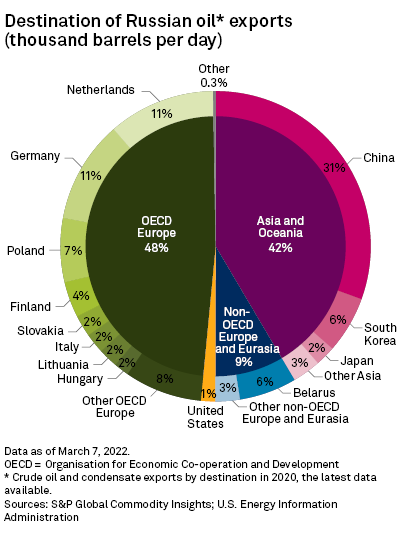S&P Global Offerings
Featured Topics
Featured Products
Events
S&P Global Offerings
Featured Topics
Featured Products
Events
S&P Global Offerings
Featured Topics
Featured Products
Events
Banking & Capital Markets
Economy & Finance
Energy Transition & Sustainability
Technology & Innovation
Podcasts & Newsletters
Banking & Capital Markets
Economy & Finance
Energy Transition & Sustainability
Technology & Innovation
Podcasts & Newsletters
S&P Global Offerings
Featured Topics
Featured Products
Events
4 May, 2022
By Alex Blackburne

| European Commission President Ursula von der Leyen announced plans to ban Russian oil imports in the EU, following similar sanctions against coal. Source: Thierry Monasse/Getty Images News via Getty Images |
The EU proposed a widely expected ban on Russian oil imports May 4 in its sixth round of sanctions aimed at putting pressure on Russia over its invasion of Ukraine.
"Let us be clear: It will not be easy," European Commission President Ursula von der Leyen said in a speech to announce the sanctions. "Some member states are strongly dependent on Russian oil. But we simply have to work on it."
Russia accounted for about a quarter of the EU's oil imports in 2021, according to EU data, with Germany, the Netherlands and Poland the largest buyers. The sanctions are designed to cut a major source of revenue for Russia, which sends about half of its oil exports to Europe, according to the International Energy Agency.
The EU plans to be energy independent from Russia by 2027, having already unveiled a ban on coal imports and announced a plan to cut Russian natural gas imports by two-thirds by the end of 2022.
 |
"This will be a complete import ban on all Russian oil," von der Leyen said, including oil transported by sea and pipelines.
Crude oil imports will be phased out within six months and refined products by the end of the year, maximizing the pressure on Russia while minimizing the collateral damage to the EU and its partners, von der Leyen said.
"We will make sure that we phase out Russian oil in an orderly fashion, in a way that allows us and our partners to secure alternative supply routes and minimizes the impact on global markets," the president said. "Because to help Ukraine, our own economy has to remain strong."
The sanctions follow Russian oil bans announced by the U.S. and the U.K. in March. Both countries produce oil domestically and are less reliant than the EU on Russian imports.
In 2021, four EU countries — Bulgaria, Slovakia, Hungary and Finland — derived more than 75% of their imports of petroleum oils from Russia. Hungary and Slovakia will be given until the end of 2023 to enforce the import ban, Bloomberg News reported May 4.
Germany, the EU's largest economy, is heavily reliant on Russian energy imports and had previously opposed oil sanctions. However, in recent days the government's stance has shifted to support a ban, Reuters reported May 2.
"Germany is not against an oil ban on Russia," Economy Minister Robert Habeck was quoted as telling reporters. "Of course it is a heavy load to bear but we would be ready to do that."
S&P Global Commodity Insights produces content for distribution on S&P Capital IQ Pro.
